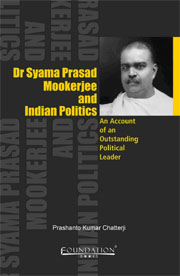Book contents
- Frontmatter
- Contents
- Preface
- 1 Dr Syama Prasad Mookerjee as the Finance Minister of Bengal, 1941–1942
- 2 Syama Prasad and Hindu Mahasabha's Ascendancy in Indian Politics, 1938–1944
- 3 Syama Prasad and Hindu Mahasabha's Transitory Resuscitation after Reverses, 1945–1947
- 4 Syama Prasad's Achievements as the Central Cabinet Minister, 1947–1950
- 5 Syama Prasad and Establishment of Bharatiya Jana Sangh, 1950–1953
- 6 Conclusion
- Appendix I
- Appendix II
- Appendix III
- Appendix IV
- Appendix V
- Appendix VI
- Appendix VII
- Bibliography
- Index
1 - Dr Syama Prasad Mookerjee as the Finance Minister of Bengal, 1941–1942
Published online by Cambridge University Press: 05 February 2012
- Frontmatter
- Contents
- Preface
- 1 Dr Syama Prasad Mookerjee as the Finance Minister of Bengal, 1941–1942
- 2 Syama Prasad and Hindu Mahasabha's Ascendancy in Indian Politics, 1938–1944
- 3 Syama Prasad and Hindu Mahasabha's Transitory Resuscitation after Reverses, 1945–1947
- 4 Syama Prasad's Achievements as the Central Cabinet Minister, 1947–1950
- 5 Syama Prasad and Establishment of Bharatiya Jana Sangh, 1950–1953
- 6 Conclusion
- Appendix I
- Appendix II
- Appendix III
- Appendix IV
- Appendix V
- Appendix VI
- Appendix VII
- Bibliography
- Index
Summary
SECTION-1: Circumstances Behind Formation of Second Fazlul Haq Ministry in Bengal
The 1937 elections returned the Congress as the single largest party in Bengal but unable to form a ministry without the cooperation of at least A.K. Fazlul Haq's Krishak Praja Party. The latter being a Muslim peasant's party, accorded priority to krishak welfare, whereas the Congress wanted the release of political prisoners to be the first priority. Fazlul Haq, whom the Europeans did not trust and who had been kept far away from Government counsels for long, “was dying for power”. Disinclined to fall into the arms of the Sir Khwaja Nazimuddin-led Muslim League, Haq implored the Congress to form a coalition ministry in Bengal with himself as Premier. Dr Mookerjee regrets that “If this had been done, Bengal would never have gone under the heels of Leaguecum- British conspiracy”, “Bengal would have been a different province altogether” and “India's political history would have been different”. But the Congress High Command bungled and did not agree to this. Haq became Prime Minister, thanks to a marriage of convenience with Nazimuddin (who got the Home portfolio) arranged by Nalini Ranjan Sarkar (who became Finance Minister), a leading member of the Bengal Congress, “a clever power-broker and perfect master of the political game of changing sides”. Although numerically strong, none of the Hindu ministers enjoyed any support of the Hindu community or of the Hindu legislators and could hardly exercise any restraining influence in framing and executing government policies.
- Type
- Chapter
- Information
- Dr Syama Prasad Mookerjee and Indian PoliticsAn Account of an Outstanding Political Leader, pp. 1 - 69Publisher: Foundation BooksPrint publication year: 2010

